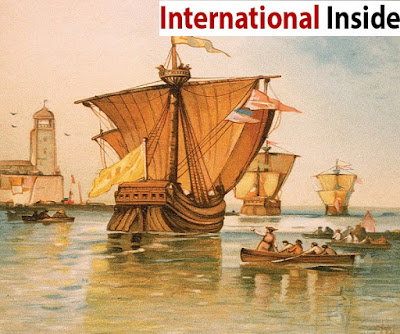The Mysterious Origins of Christopher Columbus
Christopher Columbus is forever linked with exploration and
discovery but historians are focused more than ever with exploring and
discovering the man himself more than the voyages he made across the Pacific.
In 1492, Columbus set sail to find a new trade route with
India. The Spanish monarchy financed the trip which has led some to believe
that Columbus was Spanish. But Italy has claimed the explorer for their own in
spite of the controversy around his “discovery” of the New World.
But if you look around, you can find a number of theories
linking Columbus to a large number of heritages, countries and religions. 500
years after his famous voyages, historians are still looking to understand
where the man came from.
Most everyone agrees that Columbus was born in 1451. It has
long been accepted by a large number of academics and historians that Columbus
was born in the Liguria region of what is currently the northwest part of
Italy. In those days, Genoa was the capital of Liguria. Genoa traded heavily
with other countries and it is there that Columbus seems to have learned many
languages. While a teen, he took a job with the Portuguese merchant marines and
traveled to Ireland, Iceland and West Africa.
While living in Portugal, Columbus married and had a son.
When the Portuguese government would not pay for his voyage west, he moved to
Spain and eventually convinced the king and queen of Spain to finance the trip
in 1492.
If you look at the writings of Columbus, including his will,
you will find his claim to be from Genoa. This is enough evidence for those who
want to claim Columbus as Italian. The problem is that Genoese officials never
claimed that Columbus was from there even after his success and fame. Also,
Spanish documents from the period of Columbus’s journeys do not refer to him as
a foreigner even though other foreign explorers who were supported by Spain
were explicitly identified as such.
Others look at Columbus’s close ties with Portugal and presume
that he was from that country. His Portuguese wife was from a noble family and
it is unlikely that they would have allowed a foreigner to marry their
daughter. A Portuguese engineering professor published a book in 2012 that
added additional evidence to the claim that Columbus was Portuguese. According
to the book, Columbus was actually Pedro Ataíde, who was thought to have died
in a naval battle in 1476. A group of Portuguese researchers feel that Ataíde
actually survived and changed his name in order to avoid persecution.
For More Info: https://www.internationalinside.com/history/christopher-columbus-great-hero-or-arch-villain/



Comments
Post a Comment